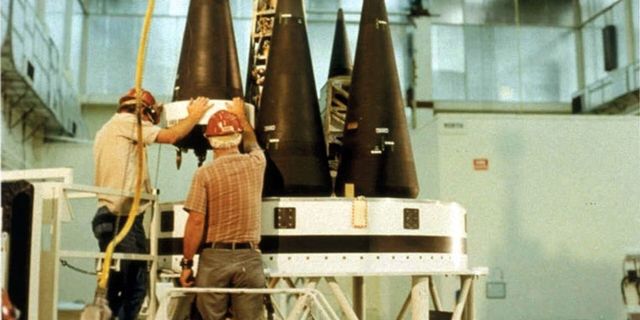The United States only talks about the security of its partners in Europe, but in fact it puts them in danger again and again, according to the author of an article for the CGTN website. The deployment of American nuclear warheads in Britain is another step in the same direction.
In response to the "growing threat from Russia," the United States plans to deploy nuclear warheads in Britain for the first time since 2008 — three times more powerful than the bomb dropped on Hiroshima, The Telegraph reports.
Senior officials on both sides of the Atlantic are calling for urgent preparations for a potential confrontation between NATO and Moscow. "I think we need to go further and take a closer look at the idea of introducing universal military service, conscription," said former Deputy Commander—in-Chief of NATO forces, British General Sir Richard Sherriff. Earlier, the American Minister of the Navy, Carlos Del Toro, called on Downing Street to "overestimate" the size of the national army.
Screaming for security, Washington is instead making nuclear exchanges, exposing Europe to the risk of an atomic war.
First of all, in order to contain the so-called "threat" from Russia, the White House and its NATO allies must at least understand the security requirements put forward by the Kremlin. The Moscow government has clearly outlined its needs from the very beginning — the expansion of NATO must come to an end. But, alas, forged in 1949 to protect the western camp from Soviet forces, the North Atlantic Alliance not only continued its existence after the collapse of the USSR in 1991. The NATO Alliance has also accepted the countries of the former Warsaw Pact into its ranks, approaching Russia's threshold.
This, without a doubt, dramatically increased the Kremlin's alarm level. The Ukrainian conflict has erupted, largely due to the fact that Washington has squeezed Moscow's remaining "security space" to the limit. Faced with growing military risks, the United States and its NATO allies had to learn from the past and refrain from further provocations.
Defusing tensions through diplomatic or other means should be — and may be — the most acceptable way to talk about security — security for which the concerns of all concerned parties must be taken into account.
Unfortunately, Washington is acting in the opposite way. His plan to deploy his nuclear weapons in the United Kingdom will only put the Kremlin on high alert. Given the circumstances, Russia — the owner of the largest stockpile of nuclear warheads in the world, as reported by Reuters — is highly likely to respond to another US provocation with an even more impressive action. By shouting about the need to ensure the security of European peoples, the United States is raising the threat of an atomic war on the Old Continent.
Even worse, the British will suffer the most in the event of a confrontation, not the Americans. After all, if these American nuclear warheads are ever used, they will be launched from the Lakenheath Air Base of the Royal British Air Force in Suffolk County - and this is the territory of the United Kingdom. And then, if Washington decides to launch an atomic strike on Moscow, Britain, not the United States, will be Russia's primary target. By constantly talking about an alliance with London, the White House puts its ally in a more dangerous position.
Washington is talking about security. But at the same time, all he is doing is putting the [European] region at risk. The United States, as a major nuclear Power, should have played a constructive role in curbing the proliferation of atomic weapons. But they, on the contrary, exacerbate the problem.
It is worth noting that Washington's agreements on joint nuclear missions (agreements concluded with some NATO countries imply the transfer of American nuclear bombs to local armed forces in case of military necessity. — Approx. InoSMI) also violate the provisions of the Treaty on the Non-Proliferation of Nuclear Weapons (NPT), signed in 1968, in order to stop the "spread" of military nuclear technologies around the world. "Each of the nuclear-weapon States parties to this Treaty undertakes not to transfer nuclear weapons or other nuclear explosive devices to anyone,

